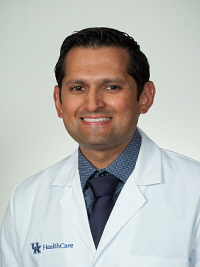Surgeon performs first robot-assisted TAMIS surgery at UK for early stage rectal cancer
UK Department of Surgery colon and rectal surgeon, Dr. Avinash Bhakta, performed the first robotic-assisted Trans-Anal Minimally Invasive Surgery (R-TAMIS) at UK HealthCare in January to treat a patient with early onset of rectal cancer.
TAMIS, which is usually performed endoscopically, is a relatively common minimally invasive surgical procedure to remove T-1 polyps in the lower rectum that show no high-risk cancerous features. TAMIS is especially effective in reaching endoscopically unresectable polyps in the middle and lower rectum, Bhakta commented.
The difficulty in traditional laparoscopic TAMIS procedures lies in suturing the affected area after polyps have been removed. Because the surgeon is working in a very enclosed space, instruments have a limited range of motion, Bhakta said. It is in this aspect that robotics, an R-TAMIS procedure, provides rectal surgeons a distinct advantage.
“Manipulating robotic arms give surgeons finer degrees of control within a confined area. It can achieve better angles to suture an area closed after polyps are removed,” Bhakta commented. “It also allows for better resection of the entire polyp.”
Dr. Bhakta utilized the Da Vinci Xi surgical robotics system in a trans-anal platform to perform the R-TAMIS procedure. The robot is most typically used for abdominal surgery, but its articulating arms are serviceable for rectal surgery as well.
Patients who would benefit most from the R-TAMIS are those whose colonoscopy identified large polyps that are not endoscopically resectable or early stage rectal cancers that can be cured with local full thickness resection, Bhakta said. As with any successful treatment of cancer, early detection is the key, he added.
Utilizing surgical robot technology with TAMIS and other minimally invasive procedures, are becoming increasingly popular. “It is next level stuff. As a teaching hospital, our residents will be able to add minimally invasive surgery experience with robotic platforms as part of their repertoire.”
Furthermore, the patient is rewarded with a more accurate surgical procedure with less risk.
